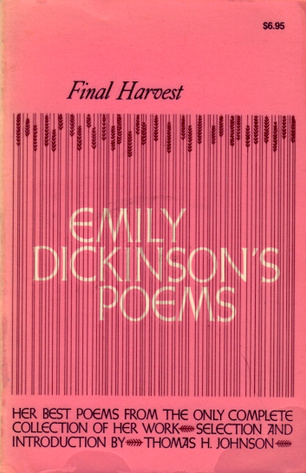

Emily Dickinson · 331 pages
Rating: (1.5K votes)
“I can wade Grief --
Whole Pools of it --
I'm used to that --
But the least push of Joy
Breaks up my feet --
And I tip -- drunken --
Let no Pebble -- smile --
'Twas the New Liquor --
That was all!”
― Emily Dickinson, quote from Final Harvest: Emily Dickinson's Poems
“I lost a world the other day. Has anybody found? You'll know it by the rows of stars around it's forehead bound. A rich man might not notice it; yet to my frugal eye of more esteem than ducats. Oh! Find it, sir, for me!”
― Emily Dickinson, quote from Final Harvest: Emily Dickinson's Poems
“We dream — it is good we are dreaming —
It would hurt us — were we awake —
But since it is playing — kill us,
And we are playing — shriek —
What harm? Men die — externally —
It is a truth — of Blood —
But we — are dying in Drama —
And Drama — is never dead —
Cautious — We jar each other —
And either — open the eyes —
Lest the Phantasm — prove the Mistake —
And the livid Surprise
Cool us to Shafts of Granite —
With just an Age — and Name —
And perhaps a phrase in Egyptian —
It's prudenter — to dream —”
― Emily Dickinson, quote from Final Harvest: Emily Dickinson's Poems
“Life is but Life! And Death, but Death!
Bliss is but Bliss, and Breath but Breath!”
― Emily Dickinson, quote from Final Harvest: Emily Dickinson's Poems
“Bind me-I still can sing-
Banish-my mandolin
Strikes true within-
Slay-and my Soul shall rise
Chanting to Paradise-
Still thine.”
― Emily Dickinson, quote from Final Harvest: Emily Dickinson's Poems

“I swear this guy must've been conceived through backdoor action. There's no way being that much of an asshole is natural.”
― Belle Aurora, quote from Willing Captive
“They've drummed the miraculous out of you, but you don't want it to be like that. You want the miraculous. You want everything to still be new.”
― Tim Tharp, quote from The Spectacular Now
“We're so different. You're an intellectual. I'm an idiot."
"Don't say that," I yelled. "You're not an idiot, you stupid idiot.”
― Melina Marchetta, quote from Looking for Alibrandi
“Guard your honor. Let your reputation fall where it will. And outlive the bastards.”
― Lois McMaster Bujold, quote from A Civil Campaign
“When someone's wounded, the first order of business is to stop the bleeding. You can figure out later how best to help them heal.”
― Jeannette Walls, quote from Half Broke Horses
BookQuoters is a community of passionate readers who enjoy sharing the most meaningful, memorable and interesting quotes from great books. As the world communicates more and more via texts, memes and sound bytes, short but profound quotes from books have become more relevant and important. For some of us a quote becomes a mantra, a goal or a philosophy by which we live. For all of us, quotes are a great way to remember a book and to carry with us the author’s best ideas.
We thoughtfully gather quotes from our favorite books, both classic and current, and choose the ones that are most thought-provoking. Each quote represents a book that is interesting, well written and has potential to enhance the reader’s life. We also accept submissions from our visitors and will select the quotes we feel are most appealing to the BookQuoters community.
Founded in 2023, BookQuoters has quickly become a large and vibrant community of people who share an affinity for books. Books are seen by some as a throwback to a previous world; conversely, gleaning the main ideas of a book via a quote or a quick summary is typical of the Information Age but is a habit disdained by some diehard readers. We feel that we have the best of both worlds at BookQuoters; we read books cover-to-cover but offer you some of the highlights. We hope you’ll join us.